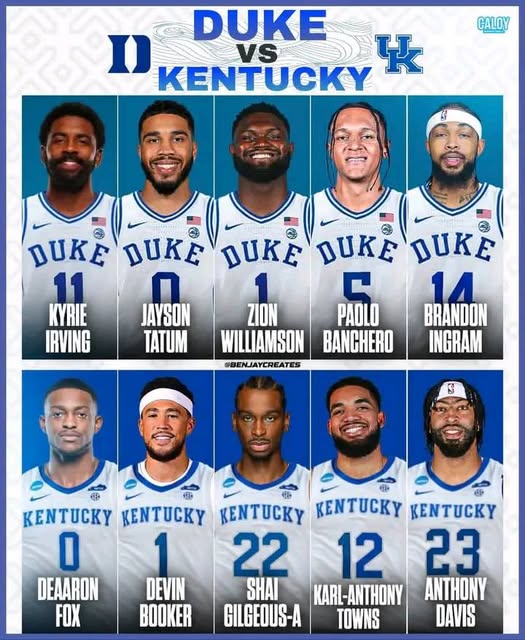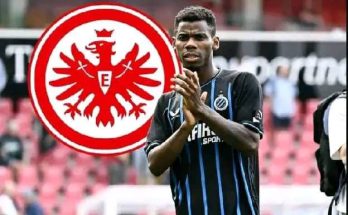In the world of college basketball, no conversation ignites more passion, debate, and statistical comparison than that of Duke versus Kentucky. These are not just programs—they are dynasties, factories of NBA talent, and cultural monoliths whose reach extends far beyond the college hardwood. The question that fans, analysts, and players themselves often argue over isn’t just who dominates the NCAA tournament or who holds the most titles. It’s who reigns supreme in the pros. When it comes to producing NBA talent, which school truly wears the crown: Duke University or the University of Kentucky?
On the surface, both schools have compelling cases. Duke boasts historic success, legendary coaching under Mike Krzyzewski, and a culture that breeds winners. Kentucky, meanwhile, under John Calipari, has become synonymous with the one-and-done era, churning out NBA-ready players at a jaw-dropping rate. Both have filled NBA rosters with All-Stars, champions, and game-changers. But determining who truly deserves the title of the premier NBA pipeline requires digging deeper—into stats, accolades, longevity, and impact.
Historically, Duke established itself earlier as an NBA player factory. Christian Laettner, Grant Hill, Elton Brand, and Shane Battier set the tone in the ’90s and early 2000s. They weren’t just NBA players—they were All-Stars, award winners, and leaders on playoff teams. Grant Hill, in particular, was on a Hall of Fame trajectory before injuries curtailed what could’ve been one of the greatest careers in NBA history. Battier, a two-time NBA champion, exemplified Duke’s classic mix of skill, basketball IQ, and unselfish play.
But Duke’s modern wave, headlined by Kyrie Irving, Jayson Tatum, Brandon Ingram, Zion Williamson, and RJ Barrett, offers more explosive, star-driven production. Irving is a champion, an 8-time All-Star, and arguably one of the most skilled point guards in NBA history. Tatum is steadily becoming one of the league’s premier scorers and two-way players, leading the Boston Celtics to deep playoff runs and finally an NBA championship in 2024. Ingram has developed into a 20-point-per-game scorer, and Zion, despite injury concerns, remains one of the most dominant physical forces when healthy.
On the other side of the aisle, Kentucky has a more recent, yet arguably deeper, track record of NBA dominance. Since John Calipari took over in 2009, the program has sent over 40 players to the NBA, many of whom became All-Stars or significant contributors. Anthony Davis is the crown jewel—a generational big man, 8-time All-Star, 2020 NBA champion, and defensive anchor. Devin Booker has established himself as one of the league’s elite scorers and a multiple-time All-Star. Karl-Anthony Towns, De’Aaron Fox, Bam Adebayo, Julius Randle, Jamal Murray, and Shai Gilgeous-Alexander all have claims to being top-tier NBA talent.
The debate intensifies when evaluating the overall depth. Kentucky alumni often have a more well-rounded distribution of roles in the league. While Duke has high-end star power, Kentucky seems to produce not just stars but also a robust group of solid role players and long-term professionals. Players like PJ Washington, Tyler Herro, Malik Monk, and Tyrese Maxey (who has become an All-Star himself) highlight how Kentucky’s reach isn’t just in numbers—it’s in meaningful, adaptable NBA careers.
Championships also play a critical role in this conversation. Duke alumni have secured rings through players like Irving (Cavaliers, 2016), Battier (Heat, 2012, 2013), and most recently Tatum (Celtics, 2024). Kentucky, though, lays claim to champions like Anthony Davis (Lakers, 2020), Rajon Rondo (Celtics, 2008; Lakers, 2020), and Jamal Murray (Nuggets, 2023), not to mention veteran contributors like Enes Freedom (née Kanter) who played key playoff roles.
Another layer is star recognition. Duke players are often more prominent in media narratives—perhaps due to Duke’s polarizing presence in college basketball—and this visibility can skew public perception. Irving and Tatum are frequently in national conversations, as is Zion, whose hype level coming into the league was LeBron-esque. Kentucky stars, by contrast, have let their games do the talking. Booker, for example, was underrated for years before finally breaking out in the Suns’ Finals run in 2021. Gilgeous-Alexander went from an under-the-radar rookie to an MVP finalist with the Thunder.
It’s also worth considering the cultural and stylistic impact each school has had through its alumni. Duke players are often associated with fundamentals, defense, and discipline—traits attributed to Coach K’s system. Kentucky players, particularly in the Calipari era, are known for athleticism, versatility, and offensive prowess. The “pro-ready” label has been applied to many Kentucky prospects, and Calipari has openly marketed the program as a stepping stone to the NBA rather than a college-first experience.
Another angle is career longevity and consistency. Duke has produced long-term pros like Hill, Battier, Luol Deng, JJ Redick, and Carlos Boozer—players who lasted a decade or more while contributing meaningfully. Kentucky’s newer wave is still unfolding, but early signs suggest that stars like Davis, Booker, Towns, and Gilgeous-Alexander could have similarly long and productive careers. Rondo, notably, had a long prime and re-emerged as a key veteran presence in later years.
Off the court, the influence of these alumni also extends into leadership roles, endorsements, and player empowerment. Irving, for better or worse, is one of the league’s most vocal and discussed figures. Redick has transitioned into media and coaching roles, becoming a leading basketball voice. Grant Hill is part of NBA ownership and executive circles. Kentucky, meanwhile, has seen Booker become a face of Nike campaigns, Davis work closely with LeBron and clutch agencies, and multiple players involved in community initiatives and business ventures.
So who wins the NBA alumni battle? The answer depends on the criteria you value most.
If your metric is star power, Duke might have the edge. Tatum and Irving are household names. Zion still commands attention. If you’re prioritizing volume and depth, Kentucky arguably overwhelms Duke in terms of sheer numbers, particularly in recent years. If championships are your guidepost, it’s almost a dead heat. If you value consistent production and long-term NBA relevance, both programs have compelling resumes.
But perhaps the most honest conclusion is that this isn’t a zero-sum game. These two schools have come to represent twin titans in the transition from college to pro basketball. They don’t just prepare players—they shape them. The debate between Duke and Kentucky isn’t about tearing one down; it’s about recognizing the distinct greatness each brings to the NBA landscape. One represents historic excellence with a blend of intellect and craft. The other symbolizes modern dominance through athleticism and pro-level development.
As the NBA continues to evolve, so too will this rivalry. Prospects from both programs will enter the draft each year, fans will stack resumes and stats side by side, and the argument will rage on in barbershops, social media threads, and studio desks on ESPN. And that’s exactly how it should be. Because in the grand, passionate world of basketball, some debates aren’t meant to be settled. They’re meant to be lived.
So, who’s really the king of pro?
Maybe it’s the school that has your favorite player. Maybe it’s the one whose stars you think will shine the longest. Or maybe, just maybe, the real winners are basketball fans—because we get to watch two pipelines of greatness flood the NBA with talent year after year.



